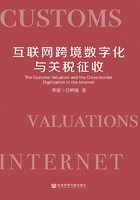
Abstract
The influence of the development of digital economy on the international economic order has drawn much attention from the international community, such as Free Trade Agreements(FTA)and Trans-Pacific Partnership Agreement(TPP)which has articles related to e-commerce and digital trade. The G20/OECD Base Erosion and Profit Shifting(BEPS)also took the task of how to address the taxation challenges of the digital economy into the action plan. Many countries are positively adjusting their national tax system to meet this trend. In this context, it highlights the necessity and urgency to search a solution to the problems of customs valuation on cross-border digital products in the internet environment.
Digital products mainly refers to products or services like data, software, audio-visual products, electronic books, etc. , which can be digitalized and transmitted over the Internet. Traditionally, such products have a physical carrier, and are classified in the category of goods, which shall be subject to customs duties. However, in the internet environment, it is difficult to conduct customs valuation and taxation on such products, for cross-border digital products are transmitted and delivered through electronic network.
As the internet economy and digital trade continue to grow, the problem of tariff loss is also growing, especially for the developing countries. With countries climbing the upstream of IT industry global value chains, the issues related to customs duties and consumption tax upon cross-border digital products have started the competition between developed and developing countries in the field of information technology. Meanwhile, under the background of Chinese economy's“new normal state”and its supply-side reform, the research on the issue of customs valuation on cross-border digital products is of great significance.
The book's main contents include the following: historical background, current situation, and the debating on the issue of customs valuation and taxation of cross-border digital products under the WTO framework; difficulties in addressing customs valuation and taxation of cross-border digital products under the existing WTO regulations-classification problems; legal limitation of the WTO agreement on customs valuation to address problems of cross-border digital products;the taxation of digital products in major countries and regions and other international reforms on digital-product-related issues; the necessity of customs duties on cross-border digital products; policy recommendations on these issues.
The main contribution of this book is to analyze the core issues of customs valuation and taxation on cross-border digital products in the internet environment under the WTO framework. Namely, the book clarifies the classification of digital products, provides the legal basis for customs valuation and taxation on such products, and presents policy recommendations on problems of how to supervise and collect customs duties and internal taxes on cross-border digital products.